英文文献汇报
- 格式:pptx
- 大小:4.26 MB
- 文档页数:19


妇产科英文文献汇报材料以下是一篇关于妇产科的英文文献汇报材料,其中注意避免使用标题相同的文字:------------------------------------------------------------ Introduction:Gynecology and obstetrics, collectively known as obstetrics and gynecology, deal with the medical care and treatment of women's reproductive health and childbirth. This branch of medicine focuses on various aspects such as prenatal care, pregnancy, childbirth, and postpartum care. In recent years, advancements in technology and medical interventions have greatly improved the outcomes and quality of care in this field.Overview of Prenatal Screening and Diagnosis Techniques: Prenatal screening and diagnosis aim to detect potential genetic and chromosomal abnormalities in the fetus during pregnancy. Various techniques have been developed to achieve this, including ultrasound imaging, maternal serum screening, and cell-free fetal DNA testing. These methods play a crucial role in identifyinghigh-risk pregnancies and providing appropriate medical interventions.Advancements in Minimally Invasive Gynecologic Surgery: Minimally invasive gynecologic surgery has revolutionized the field of obstetrics and gynecology. Techniques such as laparoscopy, hysteroscopy, and robotic-assisted surgery offer numerous benefits to patients, including reduced postoperative pain, shorter hospitalstays, and faster recovery times. These advancements have significantly improved the overall patient experience and outcomes. The Role of Artificial Intelligence in Fetal Monitoring:Artificial intelligence (AI) has shown great potential in various medical fields, and fetal monitoring is no exception. AI algorithms, coupled with electronic fetal monitoring, can accurately analyze fetal heart rate patterns and predict potential adverse outcomes. This technology has the potential to improve fetal monitoring and early detection of fetal distress, leading to better patient care and reduced morbidity and mortality rates.Emerging Trends in Assisted Reproductive Technology:Assisted reproductive technology (ART) has helped countless couples achieve their dream of parenthood. These techniques, such as in vitro fertilization (IVF) and intracytoplasmic sperm injection (ICSI), continue to evolve and improve. Recent trends in ART include preimplantation genetic testing, cryopreservation of embryos and oocytes, and the use of advanced imaging techniques to select the best-quality embryos.Conclusion:The field of obstetrics and gynecology continues to evolve and embrace new technologies and techniques to improve patient care. Advances in prenatal screening, minimally invasive surgery, AI in fetal monitoring, and assisted reproductive technology have revolutionized the practice of obstetrics and gynecology. These innovations, along with ongoing research and development, hold great promise for the future of women's health and contribute to improved health outcomes for mothers and their babies.。
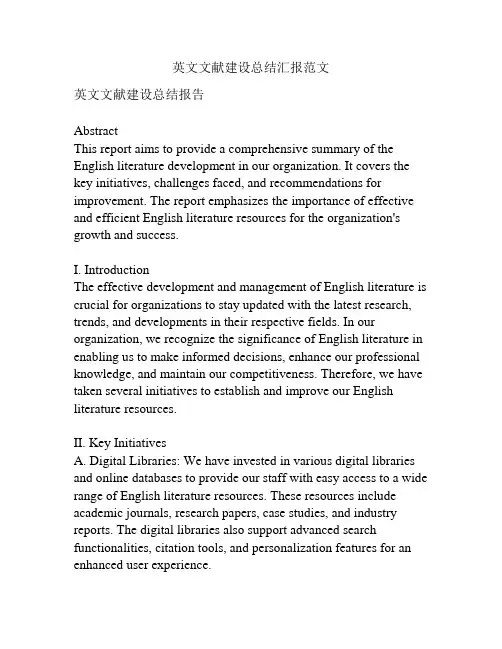
英文文献建设总结汇报范文英文文献建设总结报告AbstractThis report aims to provide a comprehensive summary of the English literature development in our organization. It covers the key initiatives, challenges faced, and recommendations for improvement. The report emphasizes the importance of effective and efficient English literature resources for the organization's growth and success.I. IntroductionThe effective development and management of English literature is crucial for organizations to stay updated with the latest research, trends, and developments in their respective fields. In our organization, we recognize the significance of English literature in enabling us to make informed decisions, enhance our professional knowledge, and maintain our competitiveness. Therefore, we have taken several initiatives to establish and improve our English literature resources.II. Key InitiativesA. Digital Libraries: We have invested in various digital libraries and online databases to provide our staff with easy access to a wide range of English literature resources. These resources include academic journals, research papers, case studies, and industry reports. The digital libraries also support advanced search functionalities, citation tools, and personalization features for an enhanced user experience.B. Literature Review Workshops: To ensure effective utilization of the available English literature resources, we have conducted regular workshops to train our staff on literature review techniques and best practices. These workshops have helped our employees to improve their ability to identify relevant literature, extract key information, and synthesize findings.C. Collaboration with External Institutions: We have established partnerships with renowned universities and research institutions to obtain access to their English literature resources. This collaboration has enabled us to expand our literature collection and gain insights from leading experts in our field. Additionally, we have participated in joint research projects and knowledge sharing initiatives to contribute to the English literature body of knowledge. III. Challenges and RecommendationsA. Limited Availability of Open Access Literature: Despite our efforts in acquiring various digital libraries, we have encountered challenges in accessing open access English literature. Open access resources provide unrestricted access to scholarly articles, which are critical for conducting comprehensive literature reviews. We recommend exploring partnerships with open access publishers or establishing institutional repositories to address this challenge.B. Language Barrier: English may not be the first language for all our staff members. This language barrier can pose difficulties in comprehending and extracting relevant information from English literature. We recommend providing language training programs to enhance employees' English language skills and improve their ability to effectively utilize English literature resources.C. Regular Evaluation of Literature Resources: The field of knowledge is constantly evolving, and it is essential to regularly evaluate our literature resources. We recommend conducting periodic reviews to assess the relevance, quality, and availability of the English literature resources we have invested in. This evaluation will help us optimize our resource allocation and ensure that our literature collection remains up-to-date.IV. ConclusionThe English literature development in our organization has played a critical role in enhancing our knowledge and contributing to our growth. As outlined in this report, we have implemented several initiatives to establish and improve our literature resources. However, we still face challenges such as limited access to open access literature and language barriers. By addressing these challenges and implementing the recommended improvements, we can further enhance our English literature capabilities and ensure continued success in our organization.。
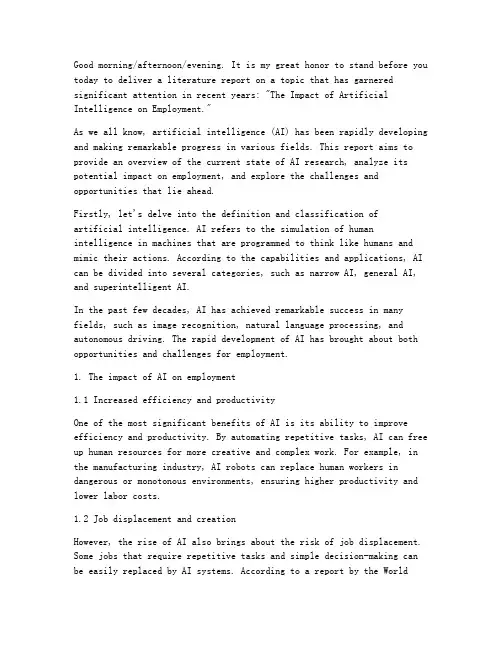
Good morning/afternoon/evening. It is my great honor to stand before you today to deliver a literature report on a topic that has garnered significant attention in recent years: "The Impact of Artificial Intelligence on Employment."As we all know, artificial intelligence (AI) has been rapidly developing and making remarkable progress in various fields. This report aims to provide an overview of the current state of AI research, analyze its potential impact on employment, and explore the challenges and opportunities that lie ahead.Firstly, let's delve into the definition and classification ofartificial intelligence. AI refers to the simulation of human intelligence in machines that are programmed to think like humans and mimic their actions. According to the capabilities and applications, AI can be divided into several categories, such as narrow AI, general AI, and superintelligent AI.In the past few decades, AI has achieved remarkable success in many fields, such as image recognition, natural language processing, and autonomous driving. The rapid development of AI has brought about both opportunities and challenges for employment.1. The impact of AI on employment1.1 Increased efficiency and productivityOne of the most significant benefits of AI is its ability to improve efficiency and productivity. By automating repetitive tasks, AI can free up human resources for more creative and complex work. For example, in the manufacturing industry, AI robots can replace human workers in dangerous or monotonous environments, ensuring higher productivity and lower labor costs.1.2 Job displacement and creationHowever, the rise of AI also brings about the risk of job displacement. Some jobs that require repetitive tasks and simple decision-making can be easily replaced by AI systems. According to a report by the WorldEconomic Forum, about 85 million jobs could be displaced by AI by 2025. On the other hand, AI also creates new job opportunities, such as AI engineers, data scientists, and AI ethics experts.1.3 Skill requirementsThe rapid development of AI has also changed the skill requirements for the workforce. In the future, individuals who possess digital skills, such as programming, data analysis, and AI knowledge, will have a competitive advantage in the job market. Meanwhile, those who lack these skills may face difficulties in finding employment.2. Challenges and opportunities2.1 ChallengesDespite the promising prospects of AI, it also poses several challenges:a. Ethical concerns: The deployment of AI raises ethical issues, such as privacy, security, and bias. Ensuring the ethical use of AI is crucial for its long-term development.b. Job security: As AI continues to replace human workers, the job security of individuals in vulnerable sectors becomes a significant concern.c. Skill gap: The rapid development of AI requires a large number of skilled professionals, which is challenging to achieve in the short term.2.2 OpportunitiesDespite the challenges, AI also presents numerous opportunities:a. Economic growth: AI can drive economic growth by increasing productivity and creating new industries.b. Innovation: AI fosters innovation in various fields, such as healthcare, education, and transportation.c. Social benefits: AI can improve the quality of life for individuals by solving complex problems and enhancing accessibility.3. Policy recommendationsTo mitigate the challenges and maximize the benefits of AI, it is essential for governments, businesses, and individuals to take the following measures:a. Education and training: Governments should invest in education and training programs to help individuals acquire the necessary digital skills.b. Policy regulation: Governments should establish policies to ensure the ethical use of AI and protect individuals' rights.c. Collaboration: Businesses and governments should collaborate to promote the development and application of AI technology.In conclusion, the impact of AI on employment is multifaceted. While it brings about challenges, it also offers numerous opportunities for economic growth, innovation, and social benefits. By addressing the challenges and leveraging the opportunities, we can create a more prosperous and sustainable future.Thank you for your attention. I welcome any questions or comments you may have.。
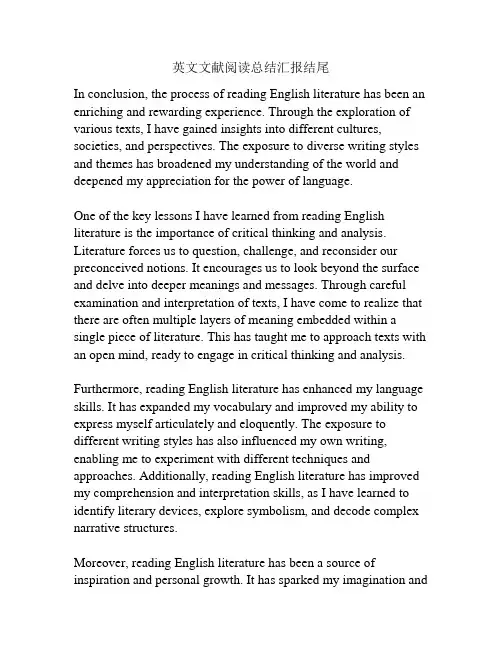
英文文献阅读总结汇报结尾In conclusion, the process of reading English literature has been an enriching and rewarding experience. Through the exploration of various texts, I have gained insights into different cultures, societies, and perspectives. The exposure to diverse writing styles and themes has broadened my understanding of the world and deepened my appreciation for the power of language.One of the key lessons I have learned from reading English literature is the importance of critical thinking and analysis. Literature forces us to question, challenge, and reconsider our preconceived notions. It encourages us to look beyond the surface and delve into deeper meanings and messages. Through careful examination and interpretation of texts, I have come to realize that there are often multiple layers of meaning embedded within a single piece of literature. This has taught me to approach texts with an open mind, ready to engage in critical thinking and analysis.Furthermore, reading English literature has enhanced my language skills. It has expanded my vocabulary and improved my ability to express myself articulately and eloquently. The exposure to different writing styles has also influenced my own writing, enabling me to experiment with different techniques and approaches. Additionally, reading English literature has improved my comprehension and interpretation skills, as I have learned to identify literary devices, explore symbolism, and decode complex narrative structures.Moreover, reading English literature has been a source of inspiration and personal growth. It has sparked my imagination andprovided a platform for creativity. The stories, characters, and themes have evoked a range of emotions within me, teaching me to empathize and connect with the experiences of others. This has deepened my understanding of human nature and broadened my perspective on life.Furthermore, reading English literature has nurtured my love for learning. It has driven me to continue exploring different genres, authors, and time periods, as there is always more to discover and learn. The exposure to different voices and perspectives has challenged my own biases and encouraged me to seek out diverse voices in all aspects of life.Lastly, the process of reading English literature has provided me with a sense of escapism and relaxation. It offers a retreat from the pressures and stresses of everyday life, allowing me to immerse myself in different worlds and stories. The act of reading itself has become a form of self-care, a way to recharge and rejuvenate.In conclusion, reading English literature has been a transformative journey. It has broadened my horizons, enhanced my language skills, sparked my imagination, and nurtured my love for learning. Through the exploration of different texts, I have gained a deeper understanding of the world and myself. I am grateful for the opportunity to engage with these texts and look forward to continuing my reading journey in the future.。
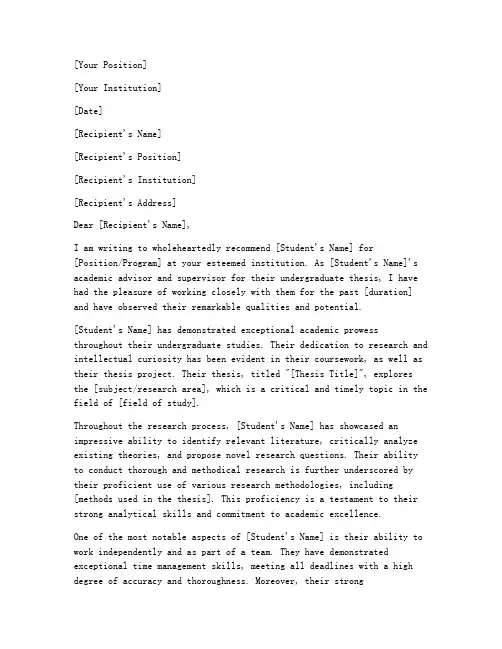
[Your Position][Your Institution][Date][Recipient's Name][Recipient's Position][Recipient's Institution][Recipient's Address]Dear [Recipient's Name],I am writing to wholeheartedly recommend [Student's Name] for[Position/Program] at your esteemed institution. As [Student's Name]'s academic advisor and supervisor for their undergraduate thesis, I have had the pleasure of working closely with them for the past [duration] and have observed their remarkable qualities and potential.[Student's Name] has demonstrated exceptional academic prowess throughout their undergraduate studies. Their dedication to research and intellectual curiosity has been evident in their coursework, as well as their thesis project. Their thesis, titled "[Thesis Title]", explores the [subject/research area], which is a critical and timely topic in the field of [field of study].Throughout the research process, [Student's Name] has showcased an impressive ability to identify relevant literature, critically analyze existing theories, and propose novel research questions. Their ability to conduct thorough and methodical research is further underscored by their proficient use of various research methodologies, including [methods used in the thesis]. This proficiency is a testament to their strong analytical skills and commitment to academic excellence.One of the most notable aspects of [Student's Name] is their ability to work independently and as part of a team. They have demonstrated exceptional time management skills, meeting all deadlines with a high degree of accuracy and thoroughness. Moreover, their strongcommunication skills have allowed them to effectively collaborate with peers and mentors, fostering a positive and productive research environment.In addition to their academic achievements, [Student's Name] has been an active participant in various extracurricular activities and organizations. Their involvement in [specific activities/organizations] has not only enriched their college experience but has also honed their leadership and teamwork abilities. Their passion for [field of study] is evident in their commitment to these activities, and I have no doubtthat they will continue to excel in this area.What sets [Student's Name] apart from their peers is their unwavering dedication to personal and professional growth. They are self-motivated, proactive, and possess a strong work ethic. Their strong moral compass and commitment to ethical research practices make them an ideal candidate for [Position/Program] at your institution.In conclusion, I am confident that [Student's Name] will bring great value to [Position/Program] at your institution. Their exceptional academic record, research abilities, and personal qualities make them a highly promising candidate. I wholeheartedly recommend [Student's Name] without reservation and would be more than happy to provide further information about their qualifications upon request.Thank you for considering [Student's Name] for [Position/Program]. I am confident that they will make a significant contribution to your institution and the field of [field of study].Sincerely,[Your Name][Your Position][Your Institution][Your Contact Information]。
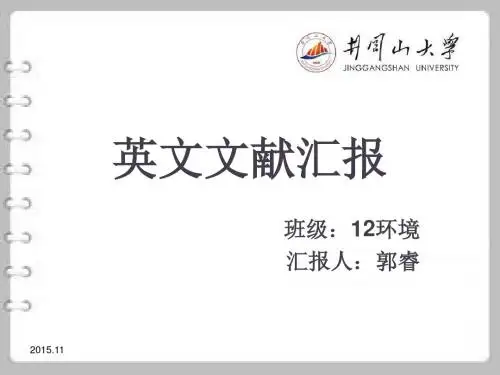
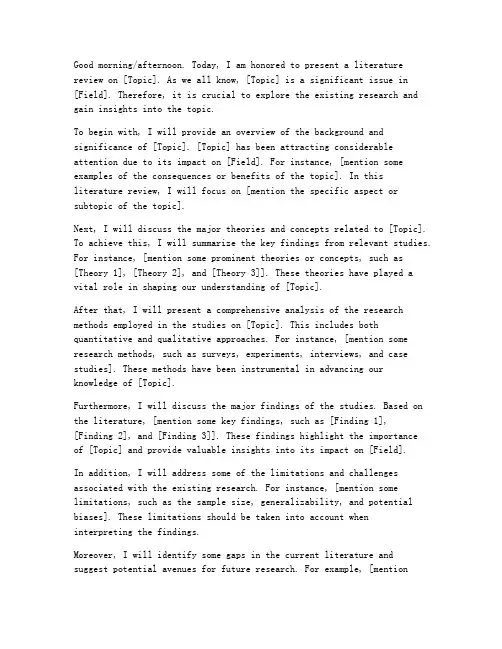
Good morning/afternoon. Today, I am honored to present a literature review on [Topic]. As we all know, [Topic] is a significant issue in [Field]. Therefore, it is crucial to explore the existing research and gain insights into the topic.To begin with, I will provide an overview of the background and significance of [Topic]. [Topic] has been attracting considerable attention due to its impact on [Field]. For instance, [mention some examples of the consequences or benefits of the topic]. In thisliterature review, I will focus on [mention the specific aspect or subtopic of the topic].Next, I will discuss the major theories and concepts related to [Topic]. To achieve this, I will summarize the key findings from relevant studies. For instance, [mention some prominent theories or concepts, such as [Theory 1], [Theory 2], and [Theory 3]]. These theories have played a vital role in shaping our understanding of [Topic].After that, I will present a comprehensive analysis of the research methods employed in the studies on [Topic]. This includes both quantitative and qualitative approaches. For instance, [mention some research methods, such as surveys, experiments, interviews, and case studies]. These methods have been instrumental in advancing our knowledge of [Topic].Furthermore, I will discuss the major findings of the studies. Based on the literature, [mention some key findings, such as [Finding 1], [Finding 2], and [Finding 3]]. These findings highlight the importanceof [Topic] and provide valuable insights into its impact on [Field].In addition, I will address some of the limitations and challenges associated with the existing research. For instance, [mention some limitations, such as the sample size, generalizability, and potential biases]. These limitations should be taken into account wheninterpreting the findings.Moreover, I will identify some gaps in the current literature andsuggest potential avenues for future research. For example, [mentionsome gaps, such as the need for more in-depth analysis of [Aspect], the exploration of [Aspect] in different contexts, and the development of new theories]. By addressing these gaps, we can further enhance our understanding of [Topic].Finally, I will summarize the key points of my presentation. Firstly, [Topic] is a crucial issue in [Field], and its significance cannot be overlooked. Secondly, the existing research has provided valuable insights into [Topic], but there are still some limitations and gapsthat need to be addressed. Thirdly, future research should focus on filling these gaps and advancing our knowledge of [Topic].In conclusion, this literature review has provided a comprehensive overview of the research on [Topic]. By understanding the existing theories, methods, and findings, we can better appreciate the importance of [Topic] and its impact on [Field]. I hope this presentation has been informative and helpful to you. Thank you for your attention.Note: This is a general framework for a literature review presentation. You should adapt it to your specific topic and include relevant details and examples.。
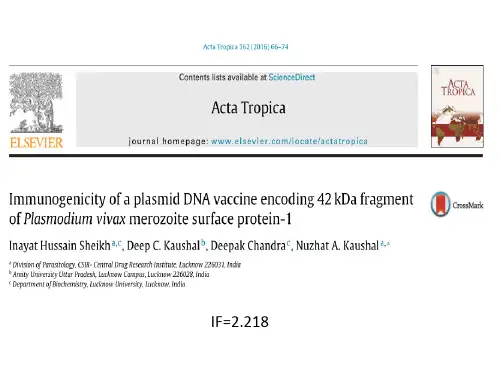
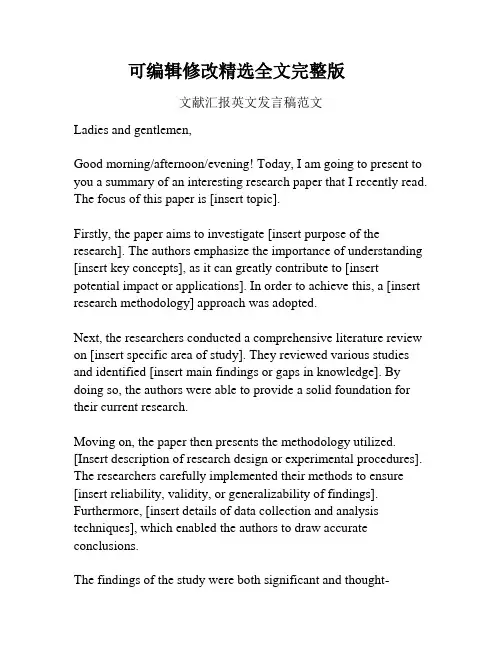
可编辑修改精选全文完整版文献汇报英文发言稿范文Ladies and gentlemen,Good morning/afternoon/evening! Today, I am going to present to you a summary of an interesting research paper that I recently read. The focus of this paper is [insert topic].Firstly, the paper aims to investigate [insert purpose of the research]. The authors emphasize the importance of understanding [insert key concepts], as it can greatly contribute to [insert potential impact or applications]. In order to achieve this, a [insert research methodology] approach was adopted.Next, the researchers conducted a comprehensive literature review on [insert specific area of study]. They reviewed various studies and identified [insert main findings or gaps in knowledge]. By doing so, the authors were able to provide a solid foundation for their current research.Moving on, the paper then presents the methodology utilized. [Insert description of research design or experimental procedures]. The researchers carefully implemented their methods to ensure [insert reliability, validity, or generalizability of findings]. Furthermore, [insert details of data collection and analysis techniques], which enabled the authors to draw accurate conclusions.The findings of the study were both significant and thought-provoking. [Insert key results or major trends], indicating a strong correlation between [insert variables of interest]. These findings confirm previous research while also revealing new insights into [insert topic]. Moreover, [insert any unexpected or surprising results] suggest the need for further investigation or alternative interpretations.Additionally, the paper includes a discussion section, where the authors interpret and analyze their results. [Insert main points of discussion or implications]. The authors also propose potential future research directions that can expand upon their work, emphasizing the importance of [insert future exploration].To conclude, this research paper contributes greatly to the understanding of [insert topic] and offers valuable implications for [insert relevant field or industry]. It addresses several gaps in knowledge while lending support to existing theories. Overall, I found this paper to be highly informative and engaging.Thank you for your attention. I am open to any questions or discussions you may have.。

Good morning/afternoon/evening. Today, I am honored to present a literature review on the topic of "The Impact of Technology on Education." This review aims to summarize and analyze the existing research on this subject, providing insights into the benefits and challenges of integrating technology into educational practices.Introduction:The rapid development of technology in recent years has significantly transformed various aspects of our lives, including education. The integration of technology in the classroom has become a hot topic among educators, policymakers, and researchers. This literature review aims to explore the impact of technology on education, focusing on its benefits, challenges, and implications for the future.Benefits of Technology in Education:1. Enhanced Learning Experience: Numerous studies have shown that technology can enhance the learning experience by providing interactive and engaging content. For instance, multimedia resources such as videos, animations, and simulations can help students better understand complex concepts.2. Increased Access to Education: Technology has made education more accessible to individuals from diverse backgrounds. Online learning platforms and e-books have eliminated geographical barriers, allowing students to access educational resources anytime and anywhere.3. Personalized Learning: Technology enables personalized learning experiences, as it can adapt to the individual needs and preferences of students. Adaptive learning platforms can provide tailored instruction, ensuring that each student reaches their full potential.4. Improved Collaboration: Collaborative tools such as online discussion forums, video conferencing, and group projects have facilitated collaboration among students and teachers. This fosters a more interactive and dynamic learning environment.Challenges of Technology in Education:1. Digital Divide: One of the significant challenges of integrating technology in education is the digital divide. Many students do not have access to the necessary technology or internet connectivity, which hinders their learning opportunities.2. Teacher Training: Educators need adequate training to effectively integrate technology into their teaching practices. Insufficienttraining can lead to ineffective use of technology and hinder student learning.3. Distraction and Misuse: Technology can be a double-edged sword, as it can also lead to distractions and misuse. Students may spend more time on social media or playing games instead of focusing on their studies.4. Data Privacy and Security: The increasing use of technology in education raises concerns about data privacy and security. Educators must ensure that student information is protected from unauthorized access and misuse.Conclusion:In conclusion, the integration of technology in education has brought numerous benefits, such as enhanced learning experiences, increased access to education, personalized learning, and improved collaboration. However, it also presents challenges, such as the digital divide, teacher training, distraction, and data privacy concerns.As technology continues to evolve, it is crucial for educators, policymakers, and researchers to address these challenges and maximize the benefits of technology in education. By doing so, we can create a more inclusive, effective, and engaging learning environment for all students.Thank you for your attention.。
组会英文文献汇报Presenter: [Your Name]Date: [Presentation Date]Introduction:Good afternoon, everyone. Thank you for taking the time to join me today for this literature review presentation. My name is [Your Name], and I'll be discussing some key findings and takeaways from recent English language research articles in the field of [Research Area].Background:Before diving into the specific articles, I'd like to provide a brief overview of the research landscape in [Research Area]. This area has seen significant growth in recent years, with numerous studies exploring various aspects of the field. The articles I've chosen for today's presentation are among the most influential and cutting-edge in this domain.Article 1: "Title of Article 1" by [Author 1, Author 2, etc.]This article provides a comprehensive overview of [topic/subfield] within [Research Area]. It identifieskey trends, challenges, and opportunities in this area. One of the most significant findings is [highlight a key finding or conclusion]. This has important implications for [how it relates to the broader field or practical applications].Article 2: "Title of Article 2" by [Author 1, Author 2, etc.]Moving on to the second article, this study focuses on [specific aspect or methodology] within [Research Area]. It employs [research method] to investigate [specific question or hypothesis]. The results indicate that [summarize key findings], which offers new insights into [how it contributes to the understanding of the field].Article 3: "Title of Article 3" by [Author 1, Author 2, etc.]The third article takes a different approach, examining [another aspect or angle of the research area]. It argues that [present the main argument or hypothesis] and provides evidence to support this claim. Among the key takeaways is [highlight a significant finding or conclusion].Conclusion and Discussion:In conclusion, the articles reviewed today offer valuable insights into various facets of [Research Area]. Collectively, they highlight the progress made in this field and identify areas ripe for further exploration. I encourage everyone to delve deeper into these articles to gain a more comprehensive understanding of the research discussed. Thank you for your attention, and I look forward to any questions or discussions that may arise.。
研究生英文文献汇报Please note that I am an AI language model and I cannot write a report for you, but I can provide you with a sample structure for a 700-word research article report. You will need to fill in the details and content based on your own research. Here is a suggested structure:Title: [Title of the Research Article]Introduction (Approximately 150 words):- Provide an overview of the research topic and its significance.- Introduce the purpose of the study and its objectives.- Briefly discuss the rationale behind the research.Literature Review (Approximately 200 words):- Review existing literature related to your research topic.- Identify key theories, concepts, and gaps in knowledge.- Highlight the significance of your study in filling these gaps. Methodology (Approximately 150 words):- Describe the research design and methodology you used.- Provide details about the participants/sample, data collection methods, and data analysis techniques.Results (Approximately 100 words):- Present the key findings of your study.- Use appropriate graphs, tables, or charts to present the data. Discussion (Approximately 200 words):- Interpret the results and relate them to the research objectives.- Discuss the implications of your findings and their relevance to the research field.- Highlight any limitations or constraints of the study.- Suggest potential directions for future research.Conclusion (Approximately 50 words):- Summarize the key findings and contributions of your study. - Highlight the significance and relevance of your research.- Provide a closing statement.References:- List all the references cited in your article using the appropriate citation style (e.g., APA, MLA, etc.).。
英文文献汇报演讲稿 Hello everyone案例一:Hello, everyone ! My name isxxx I’m from Class 1, I’m very happy to stand here to give you my free-talk. Today my topic is “To Be A Good Failure”.I believe everyone has experienced a lot . We have done good things and also bad things. When we do the bad things, we should not feel sad. We should learn from failure ,learn from every mistake and learn how to be a good loser. That’s what Ill be talking about today. Thats our lesson to learn. Let me tell you why.First, losing is a part of life. It is unavoidable. It is something we all must face. Everybody loses sometimes. Every great person knows this truth. So dont be ashamed of losing. Losing doesnt mean youre a loser.Second, don’t escape from it, just accept it. Losing is beneficial and can be helpful to you. We just view it as a learning experience. Losing is a chance to learn. You can learn how to try again and improve.Third, practice makes perfect. Create challenges for yourself. Never be afraid of failure. Lose as much as you can. Losing only makes you better. That is a great secret of success.In conclusion, remember these. You will be a good loser. It might be painful at first. But it will get easier as you go along. Youll be respected and admired. Youll feel so achievement to learn so much. You are not the real failure ,you will be a winner in future.案例二:hello everyone!The Spring Festival of the year of gengzi mouse has a special time. Since novel coronavirus pneumonia spread, Jinzhong's various departments and cadres and masses have entered the "wartime" state rapidly. From city to village, from street to end of the road, the whole city is fighting against it, contributing to the fight against epidemic prevention and control.Take responsibility in times of crisis. After the outbreak of the epidemic, the municipal Party committee and the municipal government acted in a timely manner. The main leaders studied and deployed for many times and went deep into the front-line guidancework. The leading group and all relevant departments performed their duties. The role of the grass-roots party organizations as fighting fortresses and the vanguard and exemplary role of the Communist Party members were fully played. The streets, communities and villages fully implemented the requirements, worked together to "prevent, control and treat" the epidemic, and made every effort to organize The prevention and control network has been closely organized, forming a strong joint force of four levels of joint prevention and control in cities, counties and villages.Prevention and control of the epidemic is about you, me and him. At the end of the extended holiday, many of you have to return to work, but the awareness and measures of prevention and control cannot be less. In front of the epidemic, everyone is not an island or an outsider. We are all participants and beneficiaries of the battle. Starting from me, starting from now, starting from a little bit, we can contribute to epidemic prevention and control.In extraordinary times, we should pay more attention to family and personal hygiene, wear masks, wash hands frequently and ventilate frequently, which is not only to cope with the epidemicsituation, but also to develop and promote good habits. If there is a suspected situation, it should be reported in time as required, early detection, diagnosis, treatment and isolation. In the extraordinary period, in order to maintain "extraordinary distance", in addition to work, we should try to avoid crowded places. Nowadays, with developed information, many things can be solved through the network and telephone, and we should always pay attention to the latest developments, express our concern and become conscious actions. Of course, we should maintain confidence and determination, respond to the situation in a scientific and rational way, and do not spread rumors. Do a good job in their own work, do a good job in protection, especially the front-line staff such as medical staff to protect themselves, students do not fall behind learning. Spring has come. May the patient recover soon and everyone be safe.At such a time, we should pay our highest respect to the "fighters" and "rebels" who are fighting on the front line of epidemic prevention and control. Turn respect into action and do your own thing. To protect ourselves is to protect others. To be good atourselves is to lighten others' burden. Let's overcome all the difficulties.Starting from me, I have been unremitting in our efforts to win the battle of epidemic prevention and control.。
英文文献阅读总结汇报英文文献阅读总结汇报I have recently read a research paper titled "The Impact of Artificial Intelligence on Job Market" which was published in the Journal of Economic Perspectives. The paper explores the potential implications of the rise of Artificial Intelligence (AI) on the job market and investigates whether the introduction of AI technologies will lead to widespread unemployment or not.The authors of this paper argue that while AI technologies have the potential to automate certain tasks that are currently performed by humans, they are unlikely to result in mass unemployment. They support their argument by providing empirical evidence from historical technological advancements, such as the Industrial Revolution, which also raised concerns about job displacement but ultimately resulted in new job opportunities.One of the key findings of the study is that AI technologies are more likely to complement human labor rather than replace it entirely. The authors highlight that AI can enhance productivity and efficiency in many industries by taking over repetitive and mundane tasks, thereby allowing workers to focus on more complex and creative aspects of their jobs. They also argue that the introduction of AI technologies will create new jobs and industries that have not yet been envisioned.Moreover, the paper discusses the concept of "technological unemployment" and distinguishes between "task-replacing" and "task-enhancing" technologies. Task-replacing technologies arethose that automate activities previously performed by humans, while task-enhancing technologies improve productivity and support workers in performing their tasks more efficiently. The authors argue that AI technologies fall more into the category of task-enhancing, as they are designed to assist and augment human labor rather than completely replace it.Additionally, the paper addresses the concerns regarding job polarization, where the middle-class jobs are replaced by AI technologies, leading to income inequality. The authors argue that while AI may indeed replace certain routine jobs, it also has the potential to create new high-skilled jobs that require expertise in AI and related fields. They emphasize the importance of education and skill development to ensure workers can adapt to the changing job market and take advantage of new opportunities.Overall, this research paper provides valuable insights into the impact of AI on the job market. It challenges the commonly held belief that AI technologies will lead to widespread unemployment and instead provides evidence to support the idea that AI can enhance productivity and create new job opportunities.In conclusion, the study underscores the need for a balanced perspective on the impact of AI technologies. While there may be some job displacement, the introduction of AI also presents significant opportunities for economic growth and improved productivity. It emphasizes the importance of education and skill development to ensure workers are equipped to adapt to the changing job market. Further research on this topic is warranted to gain a deeper understanding of the long-term implications of AItechnologies on the job market and to develop effective policies to mitigate potential challenges.。